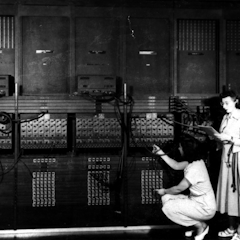
Articles on Computers
Displaying 101 - 120 of 152 articles

The brain is the most complex organ and system know to humans. It helps to create a computer model of one to find out how things work, and why things go wrong.

Computers are increasingly used to prove mathematical theorems. So does that mean human mathematicians will become obselete?

Human experience must remain at the heart of technological advances.

Computer modelling can help predict where a species will best survive, especially those affected by climate change.

The first in our series looking at the changes that have been made in computing and other areas in the 60 years since the first computer in an Australian university was switched on.

As more companies move towards intelligent, natural voice controlled devices, is the writing on the wall for the keyboard and mouse?

Computers are taking over our jobs, but this doesn’t have to be a bad thing.

Scientists of all kinds turn to computer models to investigate questions they can’t get at any other way. Here’s how models work and why we can trust them.

The Government changed the curriculum in 2014 so that all school children would be taught coding, but two years on this is far from reality.

Many of us are becoming addicted to social media, and it’s having a negative impact on our lives. Here are some tips to help you take back control.

Addicted to the internet? Perhaps not …

Many “modern” inventions actually have precedents dating back over 1000 years.

A third of families living below poverty level access the Internet only through their phones. And young people from these families get access to few learning opportunities.

Computerised High-Frequency Trading (HFC) has been blamed for recent volatility in the share market, does this represent the new normal?

As machines get ever more complex as we strive to make them complete more complex tasks, it’s time to ask again: will they ever be able to think? But what is thinking anyway?

Modern biological research relies on big data analytics. Vast reservoirs of memory and powerful computing ability mean machines find patterns and make meta-analyses and even predictions for scientists.

How often do you get angry or frustrated with a machine or some piece of technology? Well what if a machine could sense our emotion and then change its behaviour to suit?

Virtually every researcher relies on computers to collect or analyze data. But when computers are opaque black boxes that manipulate data, it’s impossible to replicate studies – a core value for science.

What is it about modern digital technology that inspires suspicion rather than trust?

It may have been big, slow and lacking in much memory but almost seven decades on we have a lot to thank the creators of Australia’s first programmable computing machine.
